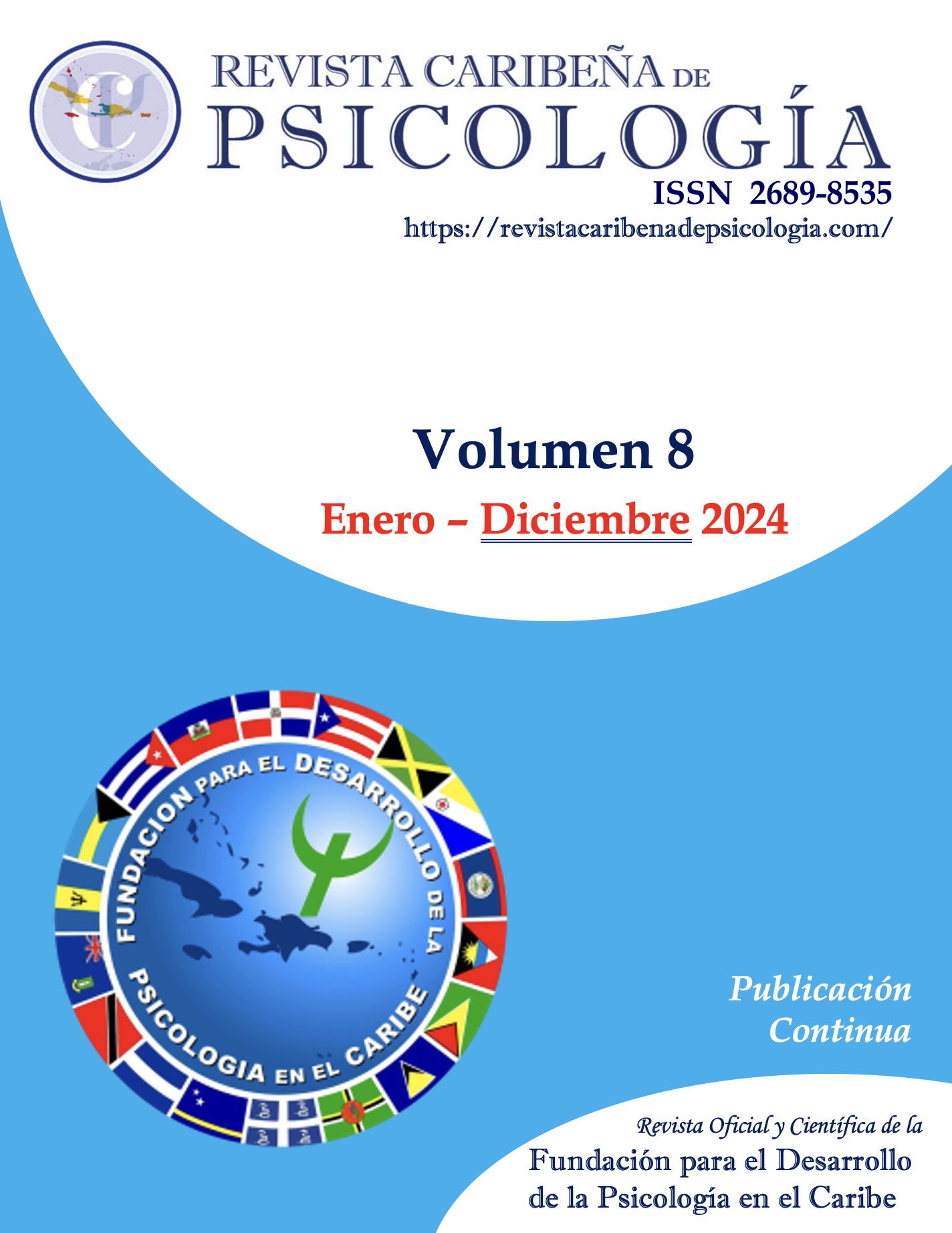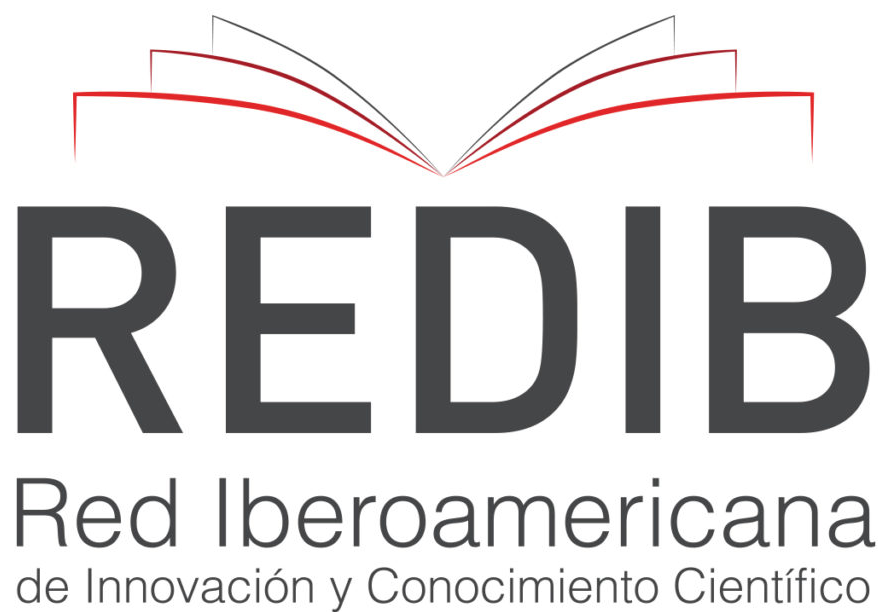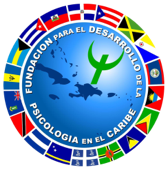The Fear of Coronavirus-19 Infection Questionnaire: Factor Structure, Psychometric Properties, and Measurement Invariance among Hispanic Adults
DOI:
https://doi.org/10.37226/rcp.v8i1.8681Palabras clave:
Análisis factorial, estudio de validación cruzada, invarianza de medida, miedo al COVID-19Resumen
COVID-19-related fear requires effective tools to assess its occurrence and associations with pandemic-related domains. We examined the factor structure and measurement invariance (MI) of the Fear of Coronavirus-19 Infection Questionnaire (FOCI-Q) among Hispanics (aged 21–79) in Puerto Rico, who completed an online survey. An exploratory factor analysis (N = 527) yielded a two-factor solution: Obsessive/Agoraphobic Fears and Interpersonal Contact Fears. Through confirmatory factor analysis (Maximum Likelihood estimation and Satorra-Bentler corrections) with two samples (N = 525–696), this model showed adequate to excellent fit (TLI = .964–.979; CFI = .976–.986; RMSRA = .065–084; SRMSR = .029–.030). Reliability coefficients were > .90 across samples. Fornell and Larcker’s and Heterotrait-Monotrait validity criteria were met. FOCI-Q scores correlated positively with posttraumatic stress, anxiety, and depression symptoms but negatively with self-ratings of physical and mental health. The scale was invariant across sex and age groups. By documenting the structure, reliability, validity, and MI of the FOCI-Q, this study supports its use among Hispanic adults.
Citas
Ahorsu, D. K., Lin, C. Y., Imani, V., Saffari, M., Griffiths, M. D., & Pakpour, A. H. (2020). The Fear of COVID-19 Scale: De-velopment and initial validation. International Journal of Mental Health and Addiction, 1–9. https://doi.org/10.1007/s11469-020-00270-8
Arpaci, I., Karataş, K., & Baloğlu, M. (2020). The development and initial tests for the psychometric properties of the COVID-19 Phobia Scale (C19P-S). Personality and Individu-al Differences, 164, 110108. https://doi.org/10.1016/j.paid.2020.110108
Arpaci, I., Karatas, K., Baloglu, M., & Haktanir, A. (2022). COVID-19 phobia in the United States: Validation of the COVID-19 Phobia Scale (C19P-SE). Death Studies, 46(3), 553–559. https://doi.org/10.1080/07481187.2020.1848945
Arroyo-Belmonte, M., Natera-Rey, G., Tiburcio-Sainz, M., & Martínez-Vélez, N. (2021). Development and psychomet-ric properties of the Adversity and Stress Scale (ASS): Val-idation in the adult Mexican population. International Journal of Mental Health and Addiction. Advance online publication. https://doi.org/10.1007/s11469-021-00669-x
Brunner, M., & SÜβ, H.-M. (2005). Analyzing the reliability of multidimensional measures: An example from intelligence research. Educational and Psychological Measurement, 65(2), 227–240. https://doi.org/10.1177/0013164404268669
Byrne, B. M. (2016). Structural equation modeling with AMOS: Basic concepts, applications, and programming. Routledge. https://doi.org/10.4324/9781315757421
Cassiani-Miranda, C. A., Tirado-Otálvaro, A. F., & Campo-Arias, A. (2022). Adaptation and psychometric evaluation of the Fear of COVID-19 Scale in the general Colombian popula-tion. Death Studies, 46(3), 595–602. https://doi.org/10.1080/07481187.2021.1874572
Caycho-Rodríguez, T., Valencia, P. D., Vilca, L. W., Cervigni, M., Gallegos, M., Martino, P., Barés, I., Calandra, M., Rey Anacona, C. A., López-Calle, C., Moreta-Herrera, R., Chacón-Andrade, E. R., Lobos-Rivera, M. E., Del Carpio, P., Quintero, Y., Robles, E., Panza Lombardo, M., Gamarra Recalde, O., Buschiazzo Figares, A., White, M., … Burgos Videla, C. (2022b). Cross-cultural measurement invari-ance of the Fear of COVID-19 Scale in seven Latin Amer-ican countries. Death Studies, 46(8), 2003–2017. https://doi.org/10.1080/07481187.2021.1879318
Caycho-Rodríguez, T., Vilca, L. W., Cervigni, M., Gallegos, M., Martino, P., Portillo, N., Barés, I., Calandra, M., & Burgos Videla, C. (2022a). Fear of COVID-19 scale: Validity, relia-bility and factorial invariance in Argentina's general pop-ulation. Death Studies, 46(3), 543–552. https://doi.org/10.1080/07481187.2020.1836071
Center for American Progress (2021, March). Latinos face dispro-portionate health and economic impacts from COVID-19. https://americanprogress.org/wp-content/uploads/2021/03/030421_LationLaborMarket-Brief3.pdf
Chen, F. F. (2007). Sensitivity of goodness of fit indexes to lack of measurement invariance. Structural Equation Modeling, 14, 464-504. https://doi.org/10.1080/10705510701301834
Cheng, P., Jasinski, N., Zheng, W., Yadava, A., Wang, L., Li, L., Xu, L., Zhou, Y., Zhang, L., & Li, W. (2021). Psychometric properties of the Primary Care PTSD Screen for DSM-5: Findings from family members of Chinese healthcare workers during the outbreak of COVID-19. Frontiers in Psychiatry, 12, 695678. https://doi.org/10.3389/fpsyt.2021.695678
Conway, L. G., III, Woodard, S. R., & Zubrod, A. (2020, April 7). Social psychological measurements of COVID-19: Coro-navirus perceived threat, government response, im-pacts,and experiences questionnaires. PsyArXiv. https://doi.org/10.31234/osf.io/z2x9a
Corral-Verdugo, V., Corral-Frías, N. S., Frías-Armenta, M., Lucas, M. Y., & Peña-Torres, E. F. (2021). Positive environments and precautionary behaviors during the COVID-19 out-break. Frontiers in Psychology, 12, 624155. https://doi.org/10.3389/fpsyg.2021.624155
Cottin, M., Hernández, C., Núñez, C., Labbé, N., Quevedo, Y., Davanzo A., & Behn, A. (2021) “What if we get sick?”: Spanish adaptation and validation of the Fear of Illness and Virus Evaluation Scale in a non-clinical sample ex-posed to the COVID-19 pandemic. Frontiers in Psychology, 12, 590283. https://doi.org/10.3389/fpsyg.2021.590283
Ehrenreich-May, J. (2020). Fear of Illness and Virus Evaluation (FIVE) scales. University of Miami. https://drive.google.com/drive/folders/1RhHt77XQzItmpw_yGAteILlMNIGpj5pU
Evans, J. (1996). Straightforward statistics for the behavioral sciences. Brooks/Cole Publishing.
Fornell, C., & Larcker, D. F. (1981). Evaluating structural equation models with unobservable variables and measurement er-ror. Journal of Marketing Research, 18(1), 39–50. https://doi.org/10.2307/3151312
Gaskin, J., James, M., & Lim, J. (2019). Master Validity Tool [AMOS Plugin]. http://statwiki.gaskination.com/index.php?title=Plugins
Hancock, G. R., & Mueller, R. O. (2001). Rethinking construct reliability within latent variable systems. In R. Cudeck, S. du Toit, & D. Soerbom (Eds.), Structural equation modeling: Present and future—A festschrift in honor of Karl Jöreskog (pp. 195-216). Scientific International.
Henseler, J. (2022). HTMT Online Calculator. http://www.henseler.com/htmt.html
Henseler, J., Ringle, C. M., & Sarstedt, M. (2015). A new criterion for assessing discriminant validity in variance-based struc-tural equation modeling. Journal of the Academy of Market-ing Science, 43 (1), 115-135. https://doi.org/10.1007/s11747-014-0403-8
Hernández, W., Burneo, A. & Cassaretto, M. (2021). Fear of COVID-19 Scale: Adaptation and psychometric properties in Peruvian population, Anxiety and Stress, 27(2), 103-111. https://www.ansiedadyestres.es/ref/2021/27-103-111
Huarcaya-Victoria, J., Elera-Fitzcarrald, C., Salvador-Carrillo, J., & Flores, C. J. (2022). Psychometric properties of the Spanish version of the fear of COVID-19 scale in Peruvian medical students. Death Studies, 46(9), 2273-2279. https://doi.org/10.1080/07481187.2021.1899340
Huarcaya-Victoria, J., Villarreal-Zegarra, D., Podestà, A., & Luna-Cuadros, M. A. (2020). Psychometric properties of a Span-ish version of the Fear of COVID-19 Scale in general population of Lima, Peru. International Journal of Mental Health and Addiction, 1–14. Advance online publication. https://doi.org/10.1007/s11469-020-00354-5
Kline, R. B. (2011). Principles and practice of structural equation mod-eling. Guilford Press.
Kroenke, K., Spitzer, R. L., Williams, J. B., & Löwe, B. (2009). An ultra-brief screening scale for anxiety and depression: the PHQ-4. Psychosomatics, 50(6), 613–621. https://doi.org/10.1176/appi.psy.50.6.613
Lin, C. Y., Hou, W. L., Mamun, M. A., Aparecido da Silva, J., Broche-Pérez, Y., Ullah, I., Masuyama, A., Wakashima, K., Mailliez, M., Carre, A., Chen, Y. P., Chang, K. C., Kuo, Y. J., Soraci, P., Scarf, D., Broström, A., Griffiths, M. D., & Pakpour, A. H. (2021). Fear of COVID-19 Scale (FCV-19S) across countries: Measurement invariance issues. Nursing Open, 8(4), 1892–1908. https://doi.org/10.1002/nop2.855
Luo. F., Ghanei Gheshlagh, R., Dalvand. S., Saedmoucheshi, S., & Li, Q. (2021). Systematic review and meta-analysis of fear of COVID-19. Frontiers in Psychology, 12, 661078. https://doi.org/10.3389/fpsyg.2021.661078
Martínez-Lorca, M., Martínez-Lorca, A., Criado-Álvarez, J. J., Armesilla, M., & Latorre, J. M. (2020). The Fear of COVID-19 scale: Validation in Spanish university students. Psychiatry Research, 293, 113350. https://doi.org/10.1016/j.psychres.2020.113350
Martínez-Taboas, A., Rosario-Rodríguez, A., & González-Rivera, J. A. (2021). COVID Stress Scales: The psychosocial impact of COVID-19 in Latinos/as. Revista Puertorriqueña de Psico-logía, 32(1), 104–118. https://www.repsasppr.net/index.php/reps/article/view/678
Mercado-Lara, M. F., Campo-Arias, A., & Monterrosa-Castro, Á. (2022). Validity and reliability of the Spanish Version of Fear of COVID-19 Scale in Colombian physicians. Interna-tional Journal of Mental Health and Addiction, 20(2), 1122–1129. https://doi.org/10.1007/s11469-020-00430-w
Meredith, W., & Teresi, J. A. (2006). An essay on measurement and factorial invariance. Medical Care, 44(11, Suppl 3), S69-S77. https://doi.org/10.1097/01.mlr.0000245438.73837.89
Mertens, G., Duijndam, S., Smeets, T., & Lodder, P. (2021). The latent and item structure of COVID-19 fear: A compari-son of four COVID-19 fear questionnaires using SEM and network analyses. Journal of Anxiety Disorders, 81, 102415. https://doi.org/10.1016/j.janxdis.2021.102415
Mertens, G., Gerritsen, L., Duijndam, S., Salemink, E., & Engel-hard, I. M. (2020). Fear of the coronavirus (COVID-19): Predictors in an online study conducted in March 2020. Journal of Anxiety Disorders, 102258. https://doi.org/10.1016/j.janxdis.2020.102258
Muller, A. E., Himmels, J. P. W. & Van de Velde, S. (2021). In-struments to measure fear of COVID-19: A diagnostic sys-tematic review. BMC Medical Research Methodology, 21, 82. https://doi.org/10.1186/s12874-021-01262-5
Muthén, L. K., & Muthén, B. O. (1998–2012). Mplus user’s guide. Muthén & Muthén.
Noe-Grijalva, M., Polo-Ambrocio, A., Gómez-Bedia, K., & Caycho-Rodríguez, T. (2022). Spanish translation and validation of the COVID Stress Scales in Peru. Frontiers in Psychology, 13, 840302. https://doi.org/10.3389/fpsyg.2022.840302
Pakpour, A.H., Griffiths, M.D. & Lin, C-Y. (2021). Assessing psy-chological response to the COVID-19: The Fear of COVID-19 Scale and the COVID Stress Scales [Letter to the edi-tor]. International Journal of Mental Health and Addiction 19, 2407–2410. https://doi.org/10.1007/s11469-020-00334-9
Piqueras, J. A., Gomez-Gomez, M., Marzo, J. C., Gomez-Mir, P., Falco, R., Valenzuela, B., & PSICORECUR-SOS COVID-19 study group (2021). Validation of the Spanish Version of Fear of COVID-19 Scale: Its association with acute stress and coping. International Journal of Mental Health and Ad-diction, 1–18. Advance online publication. https://doi.org/10.1007/s11469-021-00615-x
Pulido-Guerrero, E. G., & Jiménez-Ruiz, L. K. (2020, November 24). Validation to Spanish version of the COVID-19 Stress Scale. PsyArXiv. https://doi.org/10.31234/osf.io/rcqx3
R Core Team (2022). R: A language and environment for statistical computing. R Foundation for Statistical Computing. https://www.R-project.org/
Roemer, E., Schuberth, F., & Henseler, J. (2021). HTMT2–an im-proved criterion for assessing discriminant validity in structural equation modeling. Industrial Management & Data Systems, 121(12), 2637-2650. https://doi.org/10.1108/IMDS-02-2021-0082
Rosseel, Y. (2012). lavaan: An R package for structural equation modeling. Journal of Statistical Software, 48(2), 1-36. https://www.jstatsoft.org/v48/i02/
Sánchez-Teruel, D., & Robles-Bello, M. A. (2021). The COVID-19 Fear Scale (FCV-19S): Psychometric properties and invari-ance of the measure in the Spanish version. Actas Españo-las de Psiquiatría, 49(3), 96–105. https://pubmed.ncbi.nlm.nih.gov/33969469/
Sánchez-Teruel, D., Robles-Bello, M. A., Lara-Cabrera, M., & Va-lencia-Naranjo, N. (2022). Gender implications of the Fear of COVID-19 Scale in the Spanish population: A valida-tion study. Psychological Trauma: Theory, Research, Practice, and Policy, 14(2), 258–265. https://doi.org/10.1037/tra0001062
Satorra, A., & Bentler, P. M. (2001). A scaled difference chi-square test statistic for moment structure analysis. Psy-chometrika, 66(4), 507–514. https://doi.org/10.1007/ BF02296192
Sawicki, A. J., Żemojtel-Piotrowska, M., Balcerowska, J. M., Sawicka, M. J., Piotrowski, J., Sedikides, C., Jonason, P. K., Maltby, J., Adamovic, M., Agada, A., Ahmed, O., Al-Shawaf, L., Appiah, S., Ardi, R., Babakr, Z. H., Bălţătescu, S., Bonato, M., Cowden, R. G., Chobthamkit, P., De Pretto, L., … Zand, S. (2022). The Fear of COVID-19 scale: Its structure and measurement invariance across 48 coun-tries. Psychological Assessment, 34(3), 294–310. https://doi.org/10.1037/pas0001102
Schmitt, N., & Stults, D. M. (1985). Factors defined by negatively keyed items: The result of careless respondents? Applied Psychological Measurement, 9(4), 367–373. https://doi.org/10.1177/014662168500900405
Şimşir, Z., Koç, H., Seki, T., & Griffiths, M. D. (2022). The relation-ship between fear of COVID-19 and mental health prob-lems: A meta-analysis. Death Studies, 46(3), 515–523. https://doi.org/10.1080/07481187.2021.1889097
Soto-Briseño, Alejandro I., Gómez-Díaz, Rita A., Valdez-González, Adriana L., Saldaña-Espinoza, Ricardo C., Favila Bojór-quez, José J., & Wacher, Niels H. (2021). Escala de temor a la COVID-19: validación de la versión en español en la población mexicana [Fear of COVID-19 scale: validation in Spanish in the Mexican general population]. Gaceta Médi-ca de México, 157(6), 586-593. https://doi.org/10.24875/gmm.21000147
Taylor, S., Landry, C. A., Paluszek, M. M., Fergus, T. A., McKay, D., & Asmundson, G. J. G. (2020). Development and initial validation of the COVID Stress Scales. Journal of Anxiety Disorders, 72, Article 102232. https://doi.org/10.1016/j.janxdis.2020.102232
Torales, J., Ríos-González, C., O'Higgins, M., Almirón-Santacruz, J., García, O., Castaldelli-Maia, J. M., Ventriglio, A., & Barrios, I. (2022). "Coronaphobia" in Paraguay: Spanish validation of the COVID-19 Phobia Scale. Psychiatria Da-nubina, 34(1), 126-132. https://doi.org/10.24869/psyd.2022.126
Tounsi, A., Alammar, S., Almaflehi, N., Bamashmous, M., Al Ma-dani, A., & Ibrahim, M. S. (2021). Psychometric validation of the Arabic Fear of Illness and Virus Evaluation. Interna-tional Journal of Environmental Research and Public Health, 18(16), 8529. https://doi.org/10.3390/ijerph18168529
Wang, J. & Wang, X. (2012). Structural equation modeling applica-tions using Mplus. John Wiley & Sons Ltd. http://dx.doi.org/10.1002/9781118356258
Vandenberg, R. J., & Lance, C. E. (2000). A review and synthesis of the measurement invariance literature: Suggestions, practices, and recommendations for organizational re-search. Organizational Research Methods, 3(1), 4-69. https://doi.org/10.1177/109442810031002
Villalobos, B. T., & Hernandez-Rodriguez, J. (2021, January 13). The mental health of Latinx adults in the United States dur-ing the coronavirus pandemic: A snapshot of anxiety, depres-sion, and posttraumatic stress symptoms. PsyArXiv. https://doi.org/10.31234/osf.io/uq5y2
Descargas
Publicado
Cómo citar
Número
Sección
Licencia
Derechos de autor 2024 Eduardo Cumba-Avilés, Orlando M. Pagán-Torres, Ernesto Rosario-Hernández

Esta obra está bajo una licencia internacional Creative Commons Atribución 4.0.







